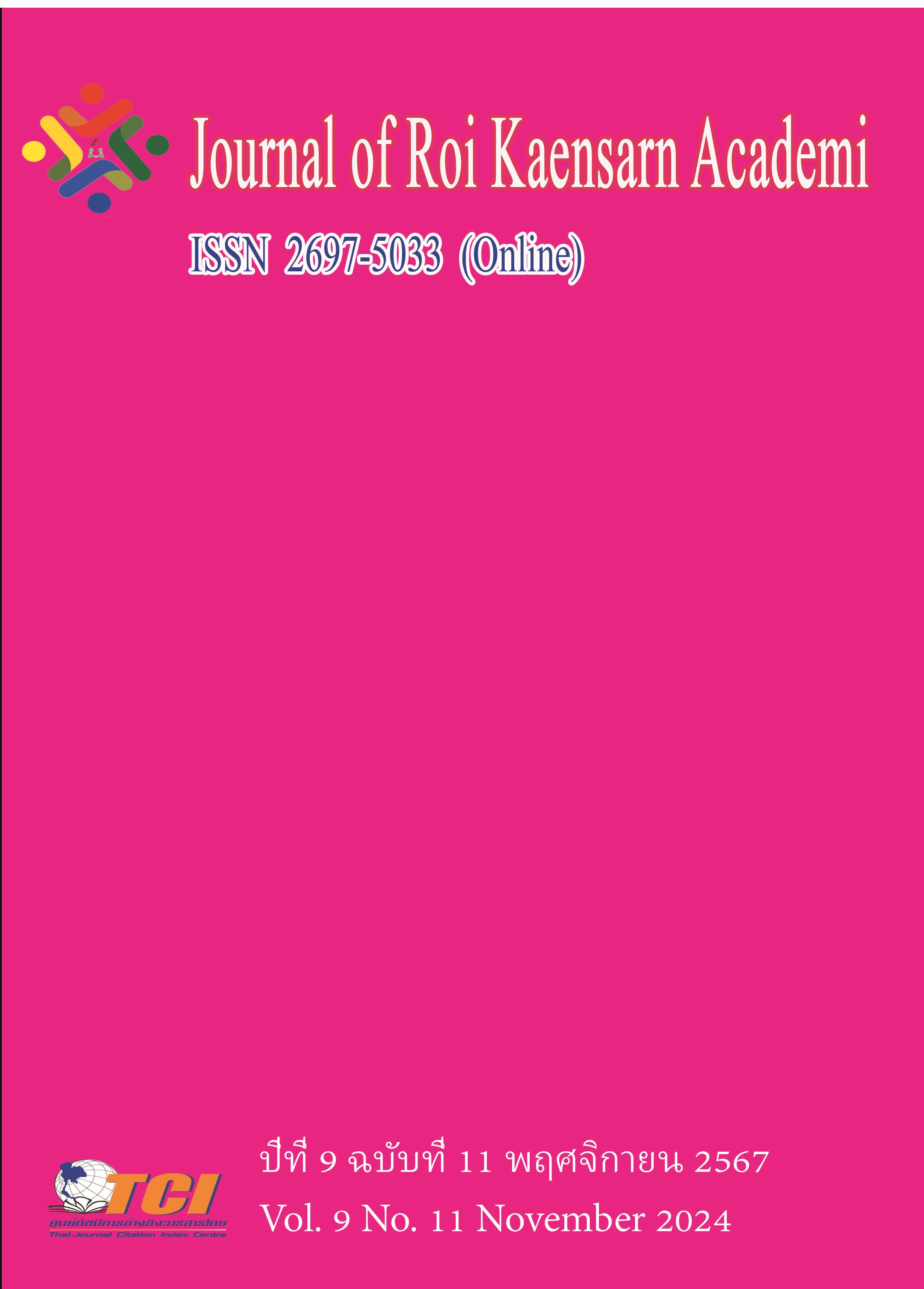The Development of an Instructional Model for Self-Discovery Learning for Online Teaching: Foundation of Education Course
Main Article Content
Abstract
As online education has become increasingly prevalent, there is a growing need to develop innovative teaching models that can effectively engage students and enhance learning outcomes. This study aimed to: 1) develop a Self-Discovery Learning (SDL) teaching model for online instruction, 2) compare students' academic performance between pre-test and post-test results using this model, and 3 ) assess student satisfaction with the implemented teaching model. A sample of 30 students was selected using stratified random sampling. The statistical methods employed in the study involved paired t-tests to compare academic achievement results and descriptive statistics to analyze student satisfaction levels.
Results indicated the following: 1) the development of the model for online teaching in the basic education curriculum: The development of the teaching model followed the principles of constructivism, emphasizing learning through creation, collaboration, and knowledge construction linked to real-world contexts. The SDL model was applied across four lessons, integrating digital tools and interactive learning activities. The model effectively supported: Learning through creation; Emphasizing the importance of working with tangible elements; Encouraging creative learning and collaboration; Facilitating knowledge construction linked to context; and Incorporating online teaching techniques. 2) The comparison results demonstrated a significant improvement in academic achievement. On average, students showed a marked increase in their post-test scores across multiple lessons, indicating that the SDL model effectively enhanced student knowledge and understanding. The paired t-test results revealed statistically significant differences, confirming the model's positive impact on academic performance; and 3) Results of the evaluation of student satisfaction with the model for online teaching in the basic education curriculum: The evaluation of student satisfaction revealed that learners were highly satisfied with the teaching model. Key factors contributing to their satisfaction included the variety of learning processes, the use of digital tools, and the clarity of learning objectives. The overall satisfaction rating was very high, suggesting that the model not only improved academic outcomes but also created an engaging and enjoyable learning experience. In conclusion, the developed SDL model effectively improved student academic achievement and satisfaction by incorporating constructivist principles, digital tools, and interactive learning activities, fostering creative learning, collaboration, and real-world knowledge construction.
Article Details
References
AlQaheri, H., & Panda, M. (2022). An education process mining framework: Unveiling meaningful information for understanding students’ learning behavior and improving teaching quality. Information. 13 (1), 29.
Anca, M. (2023). Educational autonomy and its role in student engagement. Journal of Pedagogical Development, 15 (2), 102-116.
Anderson, T. (2008). The theory and practice of online learning (2nd ed.). Athabasca University Press. pp 484.
Azevedo, R., Bouchet, F., Duffy, M., Harley, J., Taub, M., Trevor, G., Cloude, E., Dever, D., Wiedbusch, M., Wortha, F., & Cerezo, R. (2022). Lessons Learned and Future Directions of Meta Tutor: Leveraging Multichannel Data to Scaffold Self-Regulated Learning with an Intelligent Tutoring System. Frontiers in Psychology. 13. June 2022. 1-23. https://doi.org/10.3389/fpsyg.2022.813632.
Benzidia, S., Makaoui, N., & Bentahar, O. (2021). The impact of big data analytics and artificial intelligence on green supply chain process integration and hospital environmental performance. Technological Forecasting and Social Change, 165, 120557. https://doi.org/10.1016/J.TECHFORE.2020.120557.
Byukusenge, C., Nsanganwimana, F., & Tarmo, A. (2022). Effectiveness of Virtual Laboratories in Teaching and Learning Biology: A Review of Literature. International Journal of Learning, Teaching and Educational Research. 21 (6). June 2022. 1-17. https://doi.org/10.26803/ijlter.21.6.1.
Chernikova, O., Heitzmann, N., Stadler, M., Holzberger, D., Seidel, T., & Fischer, F. (2020). Simulation-based learning: Efficacy and scaffolding in higher education. Educational Research Review, 29, 100315.
Hashmi, A., Wishal, H., & Kiyani, T. (2021). The impact of constructivist teaching methods on students’ academic performance. Education Research International, 2021, 1-12.
Knowles, M. (1975). Self-Directed Learning: A Guide for Learners and Teachers. Chicago, IL: Follett Publishing Company.
Lázaro, G., & Duart, J. (2023). Technology-enhanced learning: The role of digital tools in online education. Journal of Educational Technology, 18 (2), 45-62.
Paul, D., Sanap, G., Shenoy, S., Kalyane, D., Kalia, K., & Tekade, R. K. (2021). Artificial Intelligence in Drug Discovery and Development. Drug Discovery Today, 26, 80-93.
https://doi.org/10.1016/j.drudis.2020.10.010.
Piaget, J. (1952). The origins of intelligence in children. (M. Cook, Trans.). W W Norton & Co. https://doi.org/10.1037/11494-000.
Porter, B., & Grippa, F. (2020). A Platform for AI-Enabled Real-Time Feedback to Promote Digital Collaboration. Sustainability 2020. 12 (24), 10243. https://doi.org/10.3390/ su122410243.
Reeves, S., & Crippen, K. (2020). Virtual laboratories in online education: Engagement, challenges, and solutions. Journal of Science Education and Technology, 29 (3), 215-231.
Rovinelli, R. J., & Hambleton, R. K. (1977). On the use of content specialists in the assessment of criterion-referenced test item validity. Dutch Journal of Educational Research, 2, 49-60.
Ryan, R., & Deci, E. (2020). Intrinsic and extrinsic motivation from a self-determination theory perspective: Definitions, theory, practices, and future directions. Contemporary Educational Psychology, 61, 1-31. https://doi.org/10.1016/j. cedpsych.2020.101860.
Vygotsky, L. S. (1978). Mind in society: The development of higher psychological processes. Harvard University Press.
Wallace, L. et al. (2020). Enhancing peer feedback and collaboration in online learning environments: A case study. Journal of Distance Learning, 26 (1), 88-102.
Xue, L. (2022). Design of Mathematical Online Training Interactive Framework based on AI-assisted Data Modeling Algorithm Visualization Process. 2022 International Conference on Inventive Computation Technologies (ICICT), 1099-1102. https:// doi.org/ 10.1109/ICICT54344.2022.9850548.
Zhou, Y., Chen, L., & Sun, J. (2020). A meta-analysis of the effects of digital tools in online learning environments. Journal of Educational Computing Research, 58 (5), 888-912. https://doi.org/10.1177/0735633119871647
